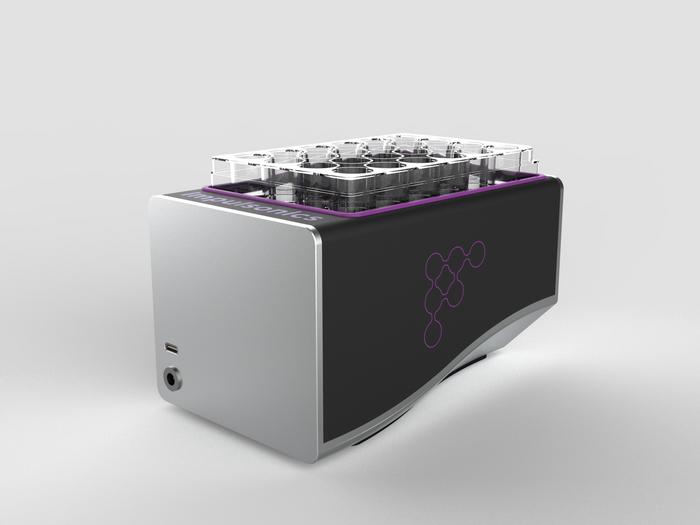Engineers at a pioneering spin-out from the University of Bristol have introduced a revolutionary technology capable of manipulation of cells without direct contact. This innovative approach enables previously labor-intensive laboratory procedures, which generally require bulky equipment, to be executed on compact benchtop devices. The implications of this advancement are profound, with potential applications that could speed up drug discovery processes and facilitate personalized medicine in clinical settings.
Detailed in a recent article published in the prestigious journal Science, this groundbreaking technology is the brainchild of Dr. Luke Cox, an innovator who transitioned from a student at the University of Bristol to the CEO of the newly minted company, Impulsonics. This publication, a prize-winning essay featured in the Bioinnovation Institute and Science Prize for Innovation, details Dr. Cox’s journey and the technology’s development.
Currently, the process of drug development is cumbersome and essential. It requires countless hours and significant resources, primarily as scientists culture cells in petri dishes to conduct various tests. Surprisingly, in 2025, this intricate procedure persists as an arduous task resistant to automation, leading to high costs and the potential for inaccuracies in drug development aimed at saving lives.
The breakthrough at Impulsonics utilizes the properties of acoustic waves to manipulate cells in a way that appears almost magical. The cells move as if dancing, demonstrating this capricious behavior without requiring the traditional, cumbersome equipment found in biomedical labs. This capability streamlines automation processes related to cell culture, vastly improving the speed and efficiency of drug discovery.
Dr. Cox initially became fascinated by the physics of acoustic levitation, where he created a groundbreaking experiment capable of suspending objects in mid-air against the force of gravity. His observations during this experiment illuminated the possibility of harnessing such technology for delicate operations involving small biological entities like cells. What started as a curiosity with levitating diamonds soon evolved into a vision for redesigning how laboratories operate, paving the way for Impulsonics.
The transformative technology developed by Luke and his dedicated team has advanced to the stage where complex biomedical tasks, such as expanding cell populations, are not only feasible but also executed far more efficiently than before. Dr. Cox emphasized the significant advantages of their technology, notably its ability to hasten the screening process of new drugs. This swift capability can accelerate the identification of new therapies for a multitude of diseases, including those as challenging as cancer and Alzheimer’s.
Furthermore, Professor Bruce Drinkwater, a collaborator and co-founder of Impulsonics, expressed his enthusiasm regarding the physical attributes of the device, which boasts a relatively small footprint—approximately half the size of a conventional laboratory bench. In stark contrast to previous technologies that required entire rooms, this compact device’s agility allows for seamless integration into existing laboratory infrastructures while ensuring a rapid yield of high-quality data, a critical demand in biomedical research.
Looking ahead, the potential applications for this pioneering invention stretch beyond the boundaries of traditional biotechnology. The device’s ability to accurately manipulate cells vows to influence various sectors within the pharmaceutical industry, from foundational research to clinical applications. Dr. Cox concluded by expressing his excitement for the future of this unique technology platform and its promise to expedite advancements across pharmaceutical and healthcare fields, particularly wherever the growth of cells is involved.
Given the competitive landscape of medical research, the contributions of this technology can potentially redefine standards for bioengineering and drug development. Scientists have historically labored under the constraints of meticulous laboratory protocols, but now, the introduction of acoustic manipulation could usher in an era characterized by expedited drug synthesis and evaluation. The ease of automation may see an unprecedented rate of medicinal discoveries, promising life-altering advancements for patients worldwide.
Ultimately, the marriage of acoustic technology with cellular biology has the potential to become a game changer, allowing researchers to shift from outdated methodologies to more agile and effective practices. As the fields of biotechnology and pharmaceuticals evolve, this promising innovation represents a significant stride towards enhancing the efficiency and effectiveness of the drug discovery process.
The vision laid out by Dr. Cox and his team could soon lead to a transformative leap in how modern medicine approaches patient health. As personalized medicine becomes an increasingly pivotal conversation within healthcare, this technology stands ready to equip clinicians with the tools they need to tailor drug therapies to individual patients, thereby maximizing efficacy and minimizing unwanted side effects. As the scientific community eagerly anticipates further developments, it is clear that the technology birthed from the University of Bristol holds immense promise and potential for a healthier tomorrow.
Subject of Research: Acoustic Manipulation of Cells
Article Title: Revolutionizing Drug Discovery: Acoustic Manipulation of Cells
News Publication Date: [Date not provided]
Web References: [Not available]
References: [Not available]
Image Credits: Impulsonics Ltd
Keywords
Acoustic technology, drug discovery, personalized medicine, biomedical research, cell manipulation, University of Bristol, Impulsonics, Science journal, innovation in healthcare.
Tags: acoustically levitating diamondsbioinnovation in healthcarebiotech automationcellular analysis technologycontactless cell manipulationdrug discovery advancementsefficient laboratory proceduresfuture of drug developmentImpulsonics company developmentpersonalized medicine applicationsScience journal publicationUniversity of Bristol innovation





